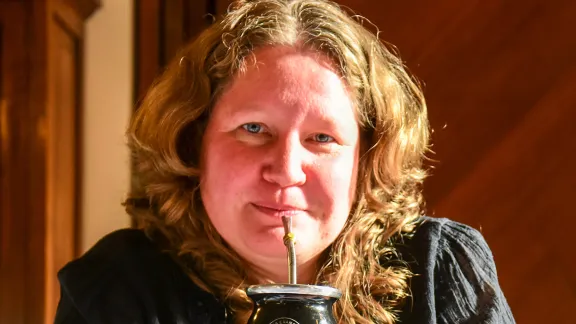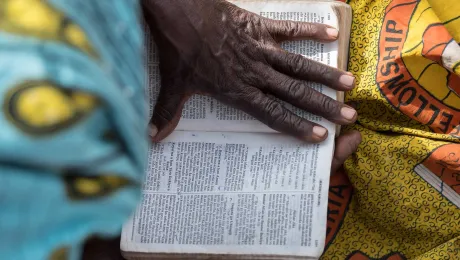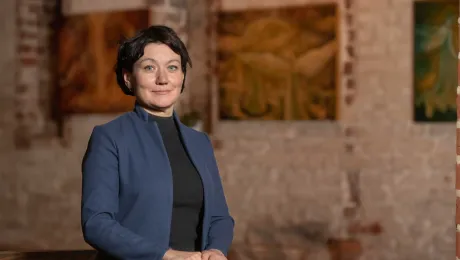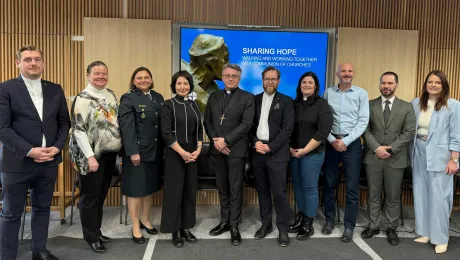
Evangelical Church of the River Plate Vice President Karina Arntzen. Photo: LWF/E. Albrecht
Voices from the Communion: Ms. Karina Arntzen
(LWI) - The daughter of a Yerba Mate tree farmer and a primary school teacher, Attorney Karina Arntzen is the first layperson to serve as vice president of the Evangelical Church of the River Plate (IERP), and the second woman ever elected to the office since the church’s independence in 1965.
Before she was elected vice president in November 2020, she served six years as secretary on the board, served many years in youth ministry and taught confirmation and catechism classes.
IERP’s new vice president reflects on what her professional skills bring to the office, the importance of youth having a voice through a vote in church decisions, and the richness that laity in church leadership brings to the function and ministries of the church.
She said she is honored to continue her work on the board as part of a team committed to carrying out the mission of God’s work in the church.
What is the role of the vice president on the IERP Board of Directors?
It is the vice president, along with the board of directors, the general secretary, and congregations who, by God’s grace, carry out the mission and direction of the church. The specific functions of the vice president on the board are to direct and supervise everything related to the administrative functioning of the church, and report what has been done in the meetings of the Board of Directors. The vice president also, summons the Board of Directors to sessions and coordinates their meetings.
One of the challenging duties of the board, recently, has been to accompany three countries [Uruguay, Paraguay, and Argentina] with different governances concerning COVID-19 regulations and restrictions. We have to navigate how we do this.
What do lay people bring to leadership in the church?
It is important to include the laity in church leadership positions as they are part of the church just as are ordained ministers. The laity, like ministers, work in communities, contribute their gifts to the mission of the church and have a voice and a way of thinking which must be heard and taken into account.
The position of vice president has always been available to lay people and until the last synod vote, a lay person had never been chosen for this role.
You worked in youth ministry for the church. How will you affirm the involvement of youth in the mission?
It is necessary and essential to give a greater role to young people in the decision-making spaces of the church and all possible participation in the work of the mission of the church.
Young people have many ideas and contribute greatly, they work dynamically and collectively, they have a strong commitment to gender justice and environmental justice and I think we have a lot to learn from them.
For example, our youth in IERP are very committed to climate justice and are doing a lot about it. I notice that messages can be heard more clearly when young people reach out. The community is motivated when they see young people working so hard for justice. Youth offer the church a different perspective.
What about your profession will be helpful in this role?
I believe that my training, both as a lawyer and as a teacher, gives me a predisposition to active listening and dialogue as a tool to contribute to the work of the church, as well as to resolve potential conflict situations.
I am convinced that dialogue is always the solution. Staying calm and listening. Sometimes we have to pause, because there may be subjects that need a longer process before a decision is reached, and we need to be patient and allow that process to happen.
Likewise, training in law helps to streamline processes and administrative work within the church.
How does your commitment to the church shape your professional career as a lawyer?
I believe that like all Christians, commitment to God and the church, influences all aspects of my personal and professional life. In particular, it leads me to sustain a strong commitment to accompany those who are most disadvantaged and who cannot always make their voices heard to demand their rights. It also carries a strong responsibility for the defense and promotion of human rights, gender justice and the defense of creation.
Being part of the church gives me the opportunity to participate in a community with which to celebrate and share my faith in God. Faith is to be lived and shared in community and the church is the framework in which we gather to do so. So being at the service of the church, for me, is being at the service of the Word of God and of my brothers and sisters in faith.
“What does it mean for your church, your work, you to be a part of the communion of churches?”
Being part of the LWF Communion of Churches implies understanding and recognizing that there are different ways and means of practicing and celebrating the faith and that, within the framework of communion, we can share, celebrate and enrich ourselves as churches, generate and deepen bonds with sister churches and other religions.
LWF/A.Gray
The Lutheran World Federation is a global body that shares the work and love of Christ in the world. In this series, we profile church leaders and staff as they discuss topical issues and set out ideas for building peace and justice in the world, ensuring the churches and communion grow in witness and strength.


